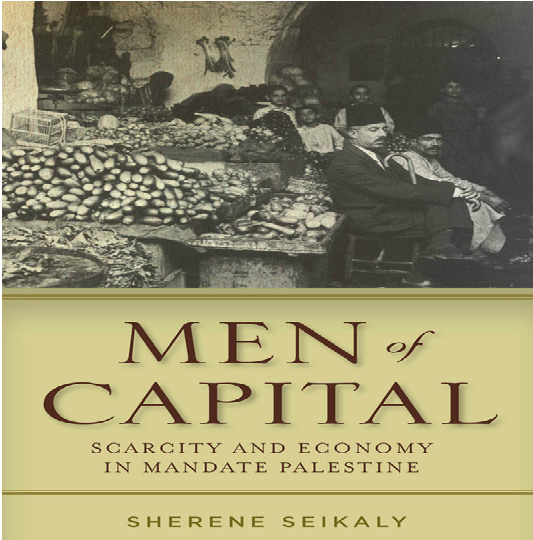
Men of Capital: Scarcity and Economy in Mandate Palestine by Sherene Seikaly, Stanford University Press (2015)
It may seem a little premature, in January, to be naming candidates for book of the year. But I’ve been waiting to get my hands on Sherene Seikaly’s Men of Capital since the start of 2014 when I saw the author present some of her research at a conference in the US.
Seikaly doesn’t disappoint. Her account of the lives and ideologies of Palestine’s British Mandate-era middle classes is lucid, engaging, detailed and genuinely groundbreaking.
Defying stereotypes of Mandate-period Palestinians as divided between a distant, dislocated upper class of “notables” and a majority of uneducated, rebellious peasants, Seikaly charts the complexities of Palestinian society of the time. Her subjects are the emergent middle classes — traders, lawyers, accountants, businessmen and senior officials (and their wives).
The portrait is fascinating, but far from idealized. Many of the attitudes she describes were snobbish and elitist. “Maids and servants,” one radio broadcaster on domestic issues warned, must not be allowed to imbibe socialist ideas about workers’ rights from foreign radio programs.
Contrary to simplistic ideas of the relationship between ideas and lifestyles in colonial Palestine, however, the classes she follows cannot just be dismissed as unthinkingly Westernizing themselves and their families or adopting colonial ideas.
Analyzing the contents of a little-known Palestinian magazine of the 1930s, al-Iqtisadiyyat al-‘arabiyya (The Arab Economic Journal, as the editors themselves translated it), Seikaly notes that some of this burgeoning middle class’ ideas were indeed influenced by Western economists such as Adam Smith. But they equally drew on thinkers such as the 14th century historian Ibn Khaldun and the 11th century philosopher al-Ghazali.
These “men of capital” were primarily concerned, Seikaly writes, with creating a stable Palestinian economy and society on what they saw as modern lines. In trying to achieve this, they regarded it as valid to draw on whatever knowledge and ideas they felt useful.
Importantly, Seikaly refuses to evaluate her subjects exclusively according to their attitudes toward the national struggle in Palestine. Some of the Haifa-based businessmen whose lives she touches on, for example, supported the uprising of 1936-39, helping to bankroll Palestinian fighters and campaigners.
Others, however, rejected the uprising and boycotts of Jewish and British Mandate businesses and jobs, seeing them as disruptive and damaging to the project of building stability and prosperity — something they, at the time, saw as equally valid.
Seikaly also highlights the gendered aspects of this middle class idea of Palestinian society. Analyzing articles and radio programs from the period, she shows how “modern” ideals of this “model middle class,” some from the West but formed in both dialogue and tension with Ottoman and Arab notions, were promoted.
Housework should be rigorously timed and scheduled, and there was a focus on ideas about hygiene and order, as found in much 1930s social theory.
In the context of 1930s Palestine, though, these ideas were significant in that they were articulated as specifically Arab, and indeed specifically Palestinian. Although they were interested in and willing to take on notions and information from elsewhere, these men and women also saw themselves as quite specifically building a new Palestine in which they and their offspring could prosper.
As such, they were also defining themselves quite particularly in contrast to Zionist immigrants. Many histories of the period tend to regard European Zionists as the source of modern and scientific ideas in Palestine as well as of economic and industrial development.
Seikaly’s narrative shows that Palestinians were more than capable of exploring, drawing from and critiquing ideas (from the East and the West) about the society and economy to which they aspired.
What they could not do, as Seikaly ultimately shows, is resist the eventual pressures of British colonialism and Zionism. That the businessmen whose lives she traces ultimately failed in constructing the national economy and model of society they sought was not, she insists, down to common orientalist or Zionist explanations about Arab disorganization and fecklessness.
The barriers they faced, and the advantages the British Mandate administration bestowed upon Zionist enterprises such as the Palestine Electric Corporation, were simply too great to challenge.
But, she points out, any idea of failure on their part also confines understanding of their efforts to within the borders of Mandate Palestine. In fact, many, such as Abdul Hameed Shoman and Abdel Mohsin al-Qattan, went on to found major corporations with influence across the Arab world.
Importantly for an academic volume, and especially one on an often dry subject such as economic history, Seikaly is a wonderfully engaging writer, introducing the businessmen, journalists and other figures who populate her narrative with clarity and verve.
She keeps jargon and heavy-duty theory to a minimum and deals with the latter deftly and in terms with which most lay readers should be able to engage.
Vegetable pricing, sales of radio sets and debates over how to measure the Palestinian economy might seem both dull and far removed from “big picture” concerns of colonialism and Zionist immigration.
But Seikaly shows, in eminently readable fashion, just why these issues were all closely entwined in Mandate Palestine, and why an understanding of them is essential to an appreciation of how and why Palestinian aspirations to independence were eventually crushed.
An absolute must-read.
(Sarah Irving is author of a biography of Leila Khaled and of the Bradt Guide to Palestine and co-editor of A Bird is not a Stone.)

